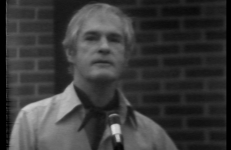In 2011 as the Congress debated the budget, Ligorano Reese installed an ice sculpture of the words Middle Class in the garden of Jim Kempner Fine Art. They filmed this timelapse of the sculpture disappearing using Senator Bernie Sanders' filibuster against the Bush tax cuts as a soundtrack with music by Michael Galasso. Senator Sanders featured it on his Senate homepage.
Ice Sculpture by Okamoto Studio.


























